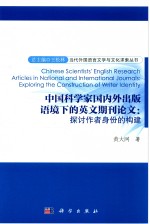

中国科学家国内外出版语境下的英文期刊论文 探讨作者身份的构建PDF电子书下载
- 电子书积分:10 积分如何计算积分?
- 作 者:黄大网著;王松林主编
- 出 版 社:北京:科学出版社
- 出版年份:2015
- ISBN:9787030448255
- 页数:218 页
Chapter One Introduction 1
1.1 Background to the Research Problem 1
1.2 Chinese Materials Scientists as Research Subject 2
1.3 Research Questions 6
1.4 Structure of This Book 8
Chapter Two Academic Writing for Multilingual Scholars 9
2.1 Scientific Writing as Scholarly Literacy 9
2.1.1 In the eyes of sociologists of scientific knowledge 9
2.1.2 In the eyes of applied discourse analysts 11
2.2 Multilingual Writers in the Postmodern Science 27
2.2.1 Contrastive (genre) analysis of textual features 28
2.2.2 Disciplinary socialization of multilingual scientist writers 33
2.3 Disciplinary Community of MS in China 38
2.3.1 Traditional culture and emergence of the community 39
2.3.2 Community size, composition and publications of the CMSs 40
2.3.3 Outflow of SCI papers and resulting problems 42
2.3.4 Enriched materiality, information gap, and modern technology 43
2.3.5 Locally-educated in-service staff as a more specific group 44
2.4 An Interim Summary 45
Chapter Three Writer Identity 46
3.1 Writer Identity: Rationale, Etymology and Conceptualization 46
3.2 Existing Studies on Writer Identity 49
3.2.1 NES and ESL student writers in Anglo-American schools 50
3.2.2 EFL/EAL writers in Anglo-American and non-Western universities 55
3.3 Relevant Terms of Writer Identity: Contexts and Research Foci 61
3.3.1 Different ways of talking about “identity” in composition research 61
3.3.2 Relationship of various identities to writer identity 67
3.4 An Interim Summary 71
Chapter Four Research Methodology 73
4.1 Research Design 73
4.2 An Integrative Model of Writer Identity 75
4.3 Data Collection 79
4.3.1 Corpus compilation 79
4.3.2 Selection of focus subjects in the study 81
4.3.3 Literacy and discourse-based interviews 84
4.3.4 Microhistory of focus RAs, office and other documents 86
4.4 Data Annotation/Processing 87
4.4.1 Matrix of identity markers in corpus searching 87
4.4.2 Software packages and coding scheme 89
4.4.3 Ethnographically-inspired case studies 92
Chapter Five CMSs Writer Identity Across Domestic and International Discourse Communities: A Corpus-Based Probe 93
5.1 Authorial Identity Constructed via Self-Mentions 93
5.1.1 Degrees of implicitness: A formal approach 94
5.1.2 Varying pragmatic forces: A discourse-functional view 95
5.1.3 Inconsistent presentation in R&D sections and implications 97
5.2 Authorial Identity Built upon Citation Practices 98
5.3 Discoursal Self Substantiated via Professional Terms 103
5.3.1 Same discipline but different domains as reflected via KKW nouns 104
5.3.2 Professional experiment-conductor: Use of procedural prefabricates 105
5.4 Discursive Construction of Writer Identity via Generic Patterns 107
5.4.1 Degrees of identification with NES researchers 108
5.4.2 Sizable heterogeneity of CMSs writers as special non-Anglophone academics 112
5.5 An Interim Summary 115
Chapter Six A Dynamic and “Harmonious” Trajectory: Identity Construction of a Junior CMSs Writer 117
6.1 Additional Remarks on Data Collection 117
6.2 Autobiographical Self in His Publication Trajectory 118
6.3 Authorial Identity: Implicit vs.Explicit 120
6.4 Discoursal Self:Theoretical/Applied Researcher vs.Gatekeeper 125
6.5 Writer Identity at Stake: Chances vs.Challenges in the Institutional Context 128
6.6 A “Harmonious”Journey in a Materiality-Enriched Research Context 129
Chapter Seven Pragmatism and Transposition of Discourse Strategies: Identi Construction of a Senior CMSs Writer 132
7.1 Autobiographical Self in His Publication Trajectory 132
7.2 Authorial Identity: Largely Implicit 135
7.3 Discoursal Self Built up in a Pragmatist Style 140
7.3.1 Tactic adaptation of research orientations across communities 140
7.3.2 A pragmatist strategy of internal textual appropriation 143
7.4 Pragmatist Local Conversations as a Controversial Promising Land 146
Chapter Eight Discussion and Implications 149
8.1 Revisiting the Integrative Writer Identity Model 149
8.2 An Enriched Genre Analysis of Identity Construction Among CMSs Writers 150
8.2.1 Autobiographical self, authorial identity and discoursal self of CMSs writers 151
8.2.2 Border-crossing as critical moments of identity construction 153
8.2.3 Local contingency, pragmatic identification and critical scholarly literacy 154
8.3 Research Implications and Pedagogical Applications 156
8.3.1 Theoretical implications 156
8.3.2 Methodological implications 157
8.3.3 Pedagogical applications 158
8.4 Limitations of the Study and Possibilities for Further Research 159
8.4.1 Limitations of the study 160
8.4.2 Possibilities for further research 161
References 164
Appendices 190
Appendix 1 Literacy Interview Guide for Specialist Informants (Conducted in Chinese) 190
Appendix 2 Source of CMSs RAs Corpus (2004~2006) 190
Appendix 3.1 Top 20 Key Key-Words in ENG Intr Texts 195
Appendix 3.2 Top 20 Key Key-Words in ENG R&D Texts 196
Appendix 3.3 Top 20 Key Key-Words in CEN IntrTexts 197
Appendix 3.4 Top 20 Key Key-Words in CEN R&D Texts 198
Appendix 3.5 Top 22 Key Key-Words in CHN IntrTexts 199
Appendix 3.6 Top 22 Key Key-Words in CHN R&D Texts 200
Appendix 3.7 Top 20 Key Key-Words in NSE Intr Texts 201
Appendix 3.8 Top 20 Key Key-Words in NSE R&D Texts 202
Appendix 4.1 Data Collection Record (Dr.Zhong) 203
Appendix 4.2 Publication Profile of Dr.Zhong (2004~2006) 204
Appendix 5.1 A Microhistory of PEN06 204
Appendix 5.2 A Microhistory of PCE02 205
Appendix 5.3 Annual Evaluation Scheme for Staff Performance (Univ01,2006) 205
Postscript 206
- 《中国当代乡土小说文库 本乡本土》(中国)刘玉堂 2019
- 《异质性条件下技术创新最优市场结构研究 以中国高技术产业为例》千慧雄 2019
- 《中国铁路人 第三届现实主义网络文学征文大赛一等奖》恒传录著 2019
- 《莼江曲谱 2 中国昆曲博物馆藏稀见昆剧手抄曲谱汇编之一》郭腊梅主编;孙伊婷副主编;孙文明,孙伊婷编委;中国昆曲博物馆编 2018
- 《中国制造业绿色供应链发展研究报告》中国电子信息产业发展研究院 2019
- 《中国陈设艺术史》赵囡囡著 2019
- 《《走近科学》精选丛书 中国UFO悬案调查》郭之文 2019
- 《清至民国中国西北戏剧经典唱段汇辑 第8卷》孔令纪 2018
- 《中国少数民族唢呐教学曲选》胡美玲编 2019
- 《莼江曲谱 1 中国昆曲博物馆藏稀见昆剧手抄曲谱汇编之一》郭腊梅主编;孙伊婷副主编;孙文明,孙伊婷编委;中国昆曲博物馆编 2018
- 《中风偏瘫 脑萎缩 痴呆 最新治疗原则与方法》孙作东著 2004
- 《水面舰艇编队作战运筹分析》谭安胜著 2009
- 《高考快速作文指导》张吉武,鲍志伸主编 2002
- 《建筑施工企业统计》杨淑芝主编 2008
- 《王蒙文集 新版 35 评点《红楼梦》 上》王蒙著 2020
- 《TED说话的力量 世界优秀演讲者的口才秘诀》(坦桑)阿卡什·P.卡里亚著 2019
- 《钒产业技术及应用》高峰,彭清静,华骏主编 2019
- 《燕堂夜话》蒋忠和著 2019
- 《近代旅游指南汇刊二编 16》王强主编 2017
- 《经久》静水边著 2019
- 《指向核心素养 北京十一学校名师教学设计 英语 七年级 上 配人教版》周志英总主编 2019
- 《《走近科学》精选丛书 中国UFO悬案调查》郭之文 2019
- 《北京生态环境保护》《北京环境保护丛书》编委会编著 2018
- 《中医骨伤科学》赵文海,张俐,温建民著 2017
- 《美国小学分级阅读 二级D 地球科学&物质科学》本书编委会 2016
- 《指向核心素养 北京十一学校名师教学设计 英语 九年级 上 配人教版》周志英总主编 2019
- 《强磁场下的基础科学问题》中国科学院编 2020
- 《小牛顿科学故事馆 进化论的故事》小牛顿科学教育公司编辑团队 2018
- 《小牛顿科学故事馆 医学的故事》小牛顿科学教育公司编辑团队 2018
- 《高等院校旅游专业系列教材 旅游企业岗位培训系列教材 新编北京导游英语》杨昆,鄢莉,谭明华 2019
